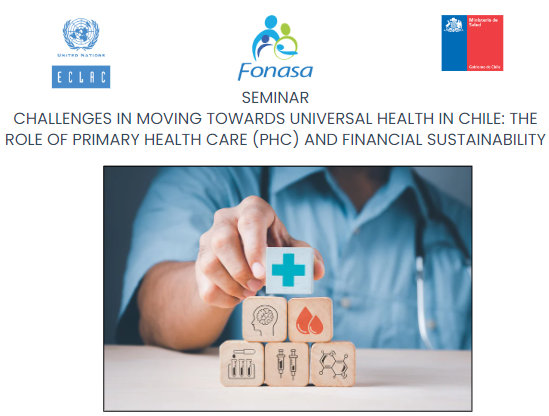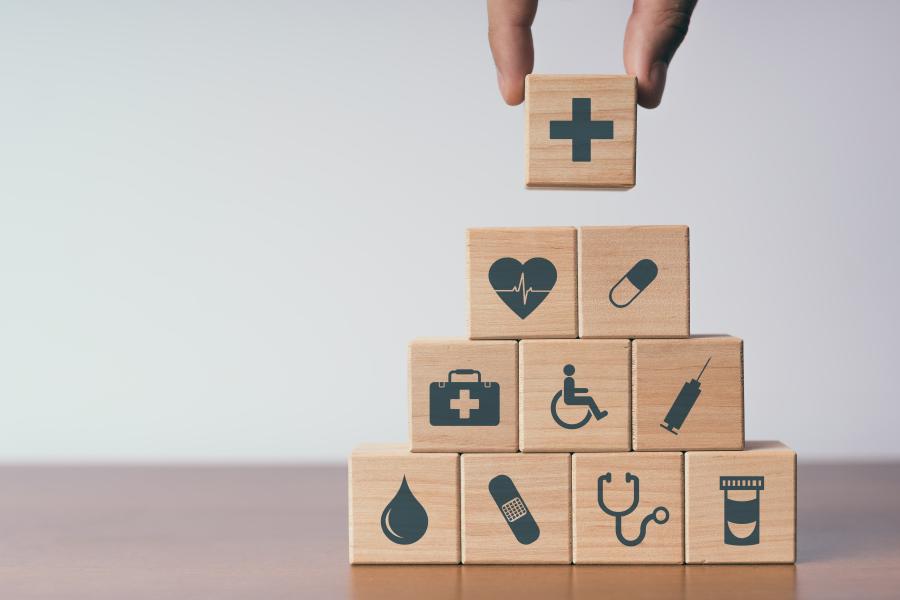Seminar "Challenges in moving towards universal health in Chile: the role of Primary Health Care (PHC) and financial sustainability"
Work area(s)
Topic(s)
Teaser
This seminar aims to discuss and reflect on the lessons learned and challenges faced in advancing towards universal health in Chile. It will focus on the centrality of the PHC strategy, and the challenges associated with financing the necessary reforms to the current health system.
Event information

Date
Event type
Participation
Background
Health is a fundamental human right and constitutes an essential component of the wellbeing of people. Without health, the exercise of other social rights is hindered, disrupting inclusive social development. However, health systems in Latin America and the Caribbean suffer from several structural weaknesses, including chronic underfunding combined with high out-of-pocket health costs, high levels of fragmentation in the provision of services and the segmentation of the population according to their ability to pay, which results in problems of access, sufficiency, coordination and inefficiency (ECLAC, 2022).
In the context of these structural weaknesses in the region's health systems, the Economic Commission for Latin America and the Caribbean (ECLAC) emphasizes the urgent need to restructure these systems and move towards universal health coverage, ensuring quality healthcare for the entire population through an increase in public health expenditure, guaranteeing its financing in a solidary and sustainable way. Furthermore, ECLAC suggests that health reforms should be accompanied through an efficient organization of health services, where primary care plays a central role, supported by a Primary Health Care (PHC) strategy. It is also crucial to incorporate the approach of social determinants of health, ensuring access to healthcare for the entire population, leaving no one behind (ECLAC, 2022).
Despite the persistent challenges in Chile's health system, such as the high out-of-pocket costs, its fragmentation, and segmentation, which disrupt the people's right to health, significant efforts and initiatives have been launched in recent years to address people's health needs. These efforts aim to transition towards a new social security structure that offers greater financial protection for households, reduces out-of-pocket expenses, and enhances the management and efficiency of resources (MINSAL 2023b).
In 2023, Chile's Ministry of Health (MINSAL) proposed a comprehensive health system reform aimed at establishing and agenda of holistic and institutional transformations. Its objective is to provide universal, timely and quality healthcare according to the needs, conditions and vulnerabilities of individuals. It also aims to modernize the public health system in order to ensure the dignity and continuity in people’s care, reduce health inequalities, guarantee greater financial protection for households, and manage health resources more efficiently (MINSAL, 2023a and 2023b).
The health system reform project comprises four pillars: 1) ensuring universal coverage of Primary Health Care (PHC), considered as the cornerstone of the reform; 2) promoting equitable conditions for healthy living through intersectoral collaboration with areas such as security, housing, and urbanism, while also involving citizen and civil society participation; 3) dignifying and modernizing the public health system by strengthening the healthcare network, reducing waiting times, and improving the overall quality and dignity of care; and 4) establishing a new social security system in health to reduce out-of-pocket health expenses and strengthen the financing in terms of the collection, administration, and allocation of resources necessary to ensure equitable and high-quality access to health services (MINSAL, 2023a and 2023b).
In this context, the Universalization of Primary Health Care (PHC) program was launched in 2023, starting with seven pioneering municipalities and expanding to a total of 21 municipalities in 2024. This program enables all registered individuals in these municipalities—regardless of their health insurance, whether from the National Health Fund (FONASA), Health Insurance Institutions (ISAPRE), or the Armed Forces and Police—to access the full range of primary care services offered by the public health system. This initiative positions PHC as a key territorial health strategy that will enable progress towards universal health coverage (MINSAL, 2023c).
Regarding the efforts to reduce out-of-pocket expenses for the population and related to financing schemes, as well as to strengthen universal access to public healthcare, since 2022, Chile has adopted the "Copago Cero" (Exempt Resolution 112), which modified the fees for health services for individuals affiliated with FONASA in sections C and D, also including those in sections A and B. As a result, since 2022, free access has been achieved across all services in the public health system, including medications, mental health and dental treatments, emergencies, prosthetics, among other programs (Government of Chile, 2024b).
Additionally, in May 2024, Law No. 21.674, also known as the “Ley Corta de ISAPRES” was enacted. This law modifies Decree with Force of Law No. 1 of 2005, grants powers to the Superintendency of Health, introduces a new care model within FONASA, and modifies regulations related to ISAPRES (Diario Constitucional, 2024). A key aspect of its legislation is the modernization and strengthening of FONASA through the creation of the Complementary Coverage Mode (MCC), which involves the development of a voluntary insurance that affiliates can choose to obtain additionally financial protection in health (FONASA, 2024). Specifically, the MCC will allow FONASA affiliates to purchase voluntary insurance to access a coverage scheme integrated by private providers of their choice, with guaranteed minimum copayments through the payment of an additional community premium to the 7% per affiliated person. This aligns with the principles of equity, solidarity, and access to health upheld by FONASA, as it is non-exclusive and non-discriminatory, and reduces payments associated with accessing private health providers (FONASA, 2024). It also contributes to the discussion on the pooling of health financing system funds, which refers to the accumulation and distribution of public resources among all members of society so that risks are not faced individually, ensuring that access to health is a universal right and a public good (Superintendence of Health, 2024).
Objective
This seminar, organized within the framework of the United Nations Development Account project "Resilient health systems with universal coverage in Latin America and the Caribbean", aims to discuss and reflect on the lessons learned and challenges faced in advancing towards universal health in Chile. It will focus on the centrality of the PHC strategy, and the challenges associated with financing the necessary reforms to the current health system. The seminar is intended to facilitate intersectoral discussion among government authorities, international experts, and officials of the Ministry of Health and FONASA.
Programme of work
Welcoming remarks
- Christian García, Undersecretary of Public Health (subrogate), Chile
- Alberto Arenas de Mesa, Director of the Social Development Division, ECLAC
Moderator: María Luisa Marinho, Social Affairs Officer, Social Development Division, ECLAC
Keynote Speech
-
Dra. Asa Christina Laurell, Director of Strategic Planning for Institutional Transformation, Instituto Mexicano del Seguro Social (IMSS),“The principles of social protection in health and its different expressions in Latin America”
Moderator: Claudia Robles, Social Affairs Officer, Social Development Division, ECLAC
Presentation(s)
Panel 1- The financing architecture for universal insurance: the centrality of pooling resources and solidarity
The objective of this panel is to address the definition of social security, discuss the importance of the financing architecture and the need to incorporate central principles such as the pooling of resources and solidarity in the distribution and use of resources, as well as the identification of its challenges.
-
Keynote Presentation: Camilo Cid, Director de FONASA, "Fonasa's Challenges for Universal Health Care"
Comments:
-
Giovanni Escalante, Representative of the Pan American Organization of the Health (PAHO) of Chile
-
Agnès Soucat, Director of Health and Social Protection, French Development Agency (virtual)
-
Javiera Martínez, Director of Budget, DIPRES
Questions and comments: 30’
Moderator: Tania Herrera, Head of the Health Planning Division, MINSAL
Presentation(s)
Panel 2- Primary Health Care (PHC) as a tool to move towards universal health: experiences of transformation
The objective of this panel is to discuss the centrality of PHC as a territorial health strategy that enables progress towards universal health and the elements that make its transformation and strengthening possible, such as its financing and data management.
-
Keynote presentation: Coordinator of the Reform of the Ministry of Health of Chile
Comments:
-
María Luisa Marinho, Social Affairs Officer, Social Development Division, ECLAC
-
Luis Tejerina, Health and Social Protection Division, Inter-American Development Bank (IDB) (virtual)
-
Diego Ramírez, Chief of Health, La Cruz, Universal PHC Program
Questions and comments: 30’
Moderator: Nancy Dawson, Head of the Commercial Management Division, FONASA
Presentation(s)
Closing remarks
- Camilo Cid, Director of FONASA
- Bernardo Martorell, Reform Coordinator, Ministry of Health, Chile
- María Luisa Marinho, Social Affairs Officer, Social Development Division, ECLAC
Moderator: Amalia Palma, Social Development Division, ECLAC
Practical information
Hybrid meeting
09:00 to 14:00 hrs (Chilean time, GMT -3)
Place: Celso Furtado Room, ECLAC
